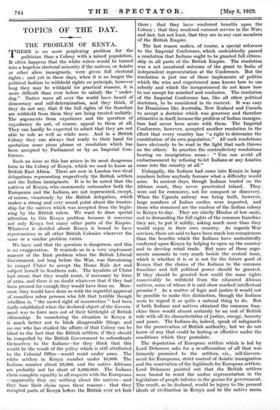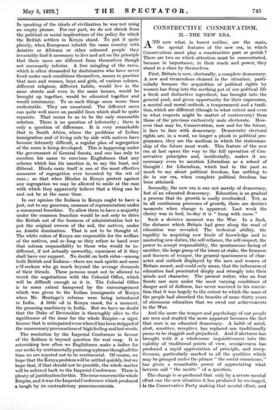TOPICS OF THE DAY.
THE PROBLEM OF KENYA.
THERE is no more perplexing problem for the politician than a Colony with a mixed population. It often happens that the white rulers would be turned into a hopeless electoral minority if the natives, or Asiatic or other alien immigrants, were given full electoral rights ; and yet in these days, when it is no longer the political fashion to withhold rights on principle, however long they may be withheld for practical reasons, it is more difficult than ever before to satisfy the "under- dog." Native races all over the world have heard of democracy and self-determination, and they think, if they do not say, that if the full rights of the franchise are withheld from them they are being treated unfairly. The arguments from experience and the question of expediency do not, of course, appeal to them at all. They can hardly be expected to admit that they are not able to rule as well as white men. And in a British Colony they can always find ready to their hand for quotation some pious phrase or resolution which has been accepted by Parliament or by an Imperial Con- ference.
Such an issue as this has arisen in its most dangerous form in the Colony of Kenya, which we used to know as British East Africa. There are now in London two rival delegations representing respectively the British settlers and the Indian immigrants. It is to be noted that the natives of Kenya, who enormously outnumber both the Europeans and the Indians, are not represented, except, of course, vicariously . by the British delegation, which makes a strong and very sound point about the trustee- ship for the natives which was accepted from the begin- ning by the British rulers. We want to draw special attention to this Kenya problem because it concerns not only Kenya but many other parts of the Empire. Whatever is decided about Kenya is bound to have repercussions in all other British Colonies wherever the same or a similar problem exists.
We have said that the question is dangerous, and this is no exaggeration. It reminds us in a very unpleasant manner of the Irish problem when the British Liberal Government, not long before the War, was threatening to compel Ulster to accept the Home Rule Act and subject herself to Southern rule. The loyalists of Ulster had sworn that they would resist, if necessary by force of arms, and there is no doubt whatever that if they had been pressed far, enough they would have done so. More- over, they would have done so with the regretful approval of countless sober persons who felt that terrible though rebellion is, "the sacred right of insurrection" had been fairly established when the declared object of the Govern- ment was to force men out of their birthright of British citizenship. In considering the situation in Kenya it is much better not to blink disagreeable things, and no one who has studied the affairs of that Colony can be blind to the fact that the British settlers, if they should be compelled by the British Government to subordinate themselves to the Indians—for they think that this would be the result of the policy which is still attributed to the Colonial Office—would resist under arms. The white settlers in Kenya number under 10,000. The Indians number about 23,000, and the native Africans are probably not far short of 8,000,000. The Indians claim complete equality in all respects with the Europeans —apparently they say nothing about the natives—and they base their claim upon these reasons : that they occupied parts of Kenya More the British ever set foot there ; that they have conferred benefits upon the Colony ; that they rendered eminent service in the War; and last, but not least, that they are in any case members of the British Empire.
The last reason makes, of course, a special reference to the Imperial Conference, which undoubtedly passed a resolution that Indians ought to be granted full citizen- ship in all parts of the British Empire. The resolution was a not unnatural outcome of the grant to India of independent representation at the Conference. But the resolution is just one of those implements of politics which the wise and experienced man knows how to use soberly and which the inexperienced do not know how to use except for mischief and confusion. The resolution of the Imperial Conference has, like all other political doctrines, to be considered in its context. It was easy for Dominions like Australia, New Zealand and Canada to accept a doctrine which was generous and therefore attractive in itself, because the problem of Indian immigra- tion had never been acute with them. The Imperial Conference, however, accepted another resolution to the effect that every country has "a right to determine the constitution of its own population." All such resolutions have obviously to be read in the light that each throws on the others. In practice the contradictory resolutions bearing on immigration mean : "You can avoid all embarrassment by -refusing to let Indians or any Asiatics come into the country at all."
Unhappily, the Indians had come into Kenya in large numbers before anybody foresaw what a difficulty would arise. In ancient days, though Indians traded on the African coast, they never penetrated inland. They were out for commerce, not for conquest or discovery. When the Uganda railway was being built, however, large numbers of Indian coolies were imported, and those who remained are the nucleus of the Indian colony in Kenya to-day. They are "chiefly Hindus of low caste, and in demanding the full rights of the common franchise they are, to put it mildly, asking much more than they would enjoy in their own country. As regards War services, these are said to have been much less conspicuous than the benefits which the Indians have undoubtedly conferred upon Kenya by helping to open up the country and to develop retail trade. But none of these argu- ments amounts to very much beside the central issue, which is whether it is or is not for the future good of Kenya that the claims of the Indians to the common franchise and full political power should be granted. If they should be granted how could the same rights conceivably be withheld from the educated African natives, some of whom it is said show marked intellectual promise ? As a matter of logic and justice it would not be possible to make this distinction, though the Indians seem .to regard it as quite a natural thing to do. But if both Indians and natives obtained the common fran- chise there would almost certainly be an end of British rule with all its characteristics of justice, energy, honesty and peace. The Indians do, indeed, speak of safeguards for the preservation of British authority, but we do not know of any that could be lasting or effective under the conditions which they postulate.
The deputation of European settlers which is led by Lord Delamere asks for a re-affirmation of all that was formerly promised to the settlers, viz., Self-Govern- ment for Europeans, strict control of Asiatic immigration and the reservation of the highlands for European settlers. Lord Delamere pointed out that the British settlers were bound to resist the undue representation in the legislature of people inferior in the genius for government. The result, as he declared, would be injury to the present ideals of civilization in'Kenya and to the native races. In speaking of the ideals of civilization he was not using an empty phrase. For our part, we do not shrink from the political or social implications of the policy for which the British settlers in Kenya stand. To put it quite plainly, when Europeans inhabit the same country with Asiatics or Africans or other coloured people they . invariably find it necessary to live and act on the principle that these races are different from themselves though not necessarily inferior. A free mingling of the races, which is often demanded by doctrinaires who have never lived under such conditions themselves, means in practice that men and women, boys and girls, of various colours, different religions, different habits, would live in the same streets and even in the same houses, would be brought up together, would be educated together and would intermarry. To us such things seem worse than undesirable. They are unnatural. The different races can quite well move on parallel lines which shall be quite separate. That seems to us to be the only reasonable solution. There is no question of inferiority ; there is only a question of difference. It is very remarkable that in South Africa, where the problems of Indian immigration and of living side by side with natives have become intensely difficult, a regular plan of segregation of the races is being developed. This is happening under the government of General Smuts, and one has only to mention his name to convince Englishmen that any scheme which has his sanction is, to say the least, not illiberal. Hindu caste itself is one of the most effective measures of segregation ever invented by the wit of man ; so that when Hindus in Kenya protest against any segregation we may be allowed to smile at the ease with which they apparently believe that a thing can be and not be at the same time.
In our opinion the Indians in Kenya ought to have a just, not to say generous, measure of representation under a communal franchise. To allow them to have a majority under the common franchise would be not only to drive the British out of the business of administration but to put the original owners of the soil, the natives, under an Asiatic domination. That is not to be thought of. The white rulers of Kenya are responsible for the welfare of the natives, and so long as they refuse to hand over that solemn responsibility to those who would be in- different, if not actually unworthy, exercisers of it they shall have our support. No doubt on both sides—among both British and Indians—there are rash spirits and mere self-seekers who go much beyond the average demands of their friends. These persons must not be allowed to wreck the negotiations with the Colonial Office, which will be difficult enough as it is. The Colonial Office is to some extent hampered by the encouragement which was given to the Indian immigrants of Kenya when Mr. Montagu's reforms were being introduced in India. A little oil in Kenya eased, for a moment, the groaning machinery in India. But we have no doubt that the Duke of Devonshire is thoroughly alive to the significance of the issue for the whole Empire—a signi- ficance that is unimpaired even when it has been stripped of the unnecessary provocations of high feeling and hot words.
The resolution by the Imperial Conference in favour of the Indians is beyond question the real snag. It is astonishing how often we Englishmen make a halter for our necks by sentimentally pursuing a phrase though all the time we are reputed not to be sentimental. Of course, we hope that the Kenya problem will be settled quickly, but we hope that, if that should not be possible, the whole matter will be referred back to the Imperial Conference. There is plenty of justification for this. The issue concerns the whole Empire, and it was the Imperial Conference which produced -a tangle by its contradictory pronouncements.















































 Previous page
Previous page